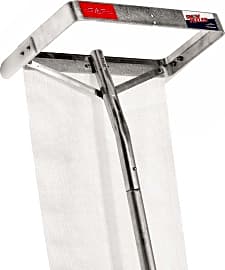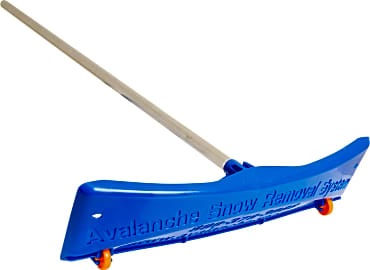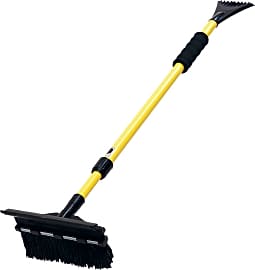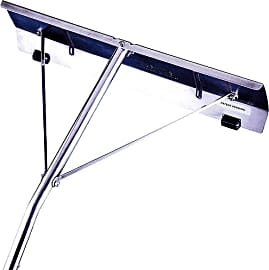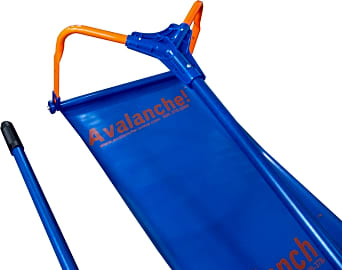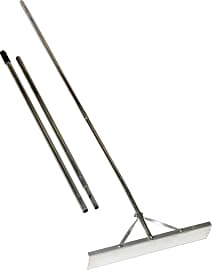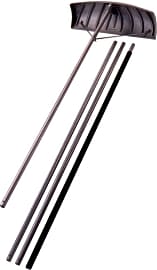The 10 Best Roof Rakes

This wiki has been updated 42 times since it was first published in January of 2016. If clearing your home's roof to prevent damage following winter storms has become an annual family tradition, you might want to invest in one of these handy, affordable snow rakes. They’ll help to stop the formation of ice dams which, when left alone, could send water into the walls and insulation of your house. Many can be extended long enough to handle two-story dwellings. When users buy our independently chosen editorial choices, we may earn commissions to help fund the Wiki.
Editor's Notes
December 27, 2019:
Joining the selection today is the Snowpeeler Premium, which is made off commercial-grade aluminum and incorporates a slide for the snow to glide right down once you’ve given it a small push. It’s actually equipped with two slides – a 10-foot one and a 15-foot one – so you can choose the one that works better with your size of roof. Both are resistant to tears, so they’ll hold up under heavy use. As for the blade, it’s got glide pads to prevent it from scraping or otherwise damaging your roof. Unlike many others, its frame is reinforced by sturdy braces, also ensuring you’ll get many seasons’ worth of use out of it.
Retaining its top spot is the Ames True Temper, which is also made for the long haul, equipped with an ergonomic end grip, a reinforced 24-inch blade. Its locking nodes make it easy to extend and collapse using your thumbs. It’s thoughtfully designed with a hanging hole on the end for storage in your garage or shed. It can be extended up to 17 feet, but more extensions are readily available from the manufacturer, for those who require them.
If you’re in the market for a gentle, yet effective, way to remove snow from the roof of your car or an awning or hot tub cover, look to the Sno Brum Compact, which features an oversized foam head and metal-free faceplate. This reliable model provides a generous four feet of reach and is manufactured in the United States.
If snow is on the way, chances are you might also be in the market for other essentials, so be sure to check out our lists of best snow shovels and best snow blowers. And once the hard work is done, be sure to take some time to enjoy yourself by having a snow sled or two on hand.
Before using a roof rake – and preferably in a time of dry weather – have your roof inspected to make sure there are no loose or cracked shingles or loose gutters that a rake could potentially damage further. While you’re using a roof rake, make sure no one is standing near where the snow and ice will be falling, as falling icicles can cause serious injuries. Also make sure the rake does not come into contact with power lines, especially since most of these rakes are aluminum. If you take the proper precautions, your roof will be cleared safely and efficiently.
Special Honors
Yeoman PolarTuff Poly Roof Rake You’ll safely remove snow while standing on the ground with this well-designed model that reaches up to 25 feet. It features an innovative coated fiberglass handle that resists twisting and slipping. Its large 24 x 6-inch poly blade has a beaded edge to protect your roof’s shingles from scratches or other damage. It’s equipped with a cushioned, non-slip grip to keep your hands comfortable while you work. yo-ho.com
Rugg Roof Rake Made in the United States, this six-pound, aluminum-handled model is lightweight for easy maneuvering, with three sections that make it extendable up to 17 feet. It offers a 25-inch poly blade and is easy to assemble and store. You can buy it with confidence, thanks to its generous, 10-year warranty. rugg.com
Stay Off Of Your Roof
Still, none of this is any good reason to go up on your roof.
I know there’s something alluring about the opportunity to see the neighborhood from the highest possible vantage point. How often has the scene outside your airplane window, or the view from your hotel room’s balcony given you pause, filled you with a bit of that wonder we lack in our daily lives?
Still, none of this is any good reason to go up on your roof. You want to alter your perspective? Try meditation; your chances of survival are much higher.
Maybe yours isn’t the tallest house on the block. Maybe you only want to go up as far as first-floor awning, not much more than 15 feet from the ground. Well, you’ll be displeased to learn that more than 40 percent of fatal falls from rooftops in the construction industry occurred from surfaces 15 feet from the ground or less.
The 2015 report that lays out the figure above, along with a slew of other fascinating fatality data, comes from the Bureau of Labor Statistics. Now, that’s just for the one year. A longer-term study conducted by the Center for Construction Research and Training, found that rooftop falls made up a whopping third of fall-related fatalities. More than 2,000 construction professionals gave up the ghost from on high between 1992 and 2009.
Keep in mind that these are only fatality statistics. The number of serious, even life-changing injuries is significantly higher.
Of course, a lot of things might end up on your roof that you’d rather not have up there. Everything from dead leaves to dead squirrels may litter the top of your home and pose a threat to the long-term integrity of your roof. Most notably, however, is snowpack. A square foot of compacted snow can weight as much as 50 lbs. That can put a tremendous amount of pressure on your roof during the winter season.
Still, climbing up there with a shovel or a push broom is probably a horrible idea. That’s why these roof rakes make such a smart investment. They allow you to keep your rooftops clean and clear of snow and dangerous debris without putting your life in danger to do so.
Just remember that the primary motion for effectively using a roof rake is a pull. That means that whatever is up there has the potential to fall right where you’re standing. While the arm length and angle of many roof rakes tries to adjust for this, it’s probably a good idea to wear gloves and safety goggles, so you won’t take a frozen squirrel carcass to the eyeball.
Identifying Your Ideal Roof Rake
Roof rakes come in a handful of different shapes and sizes, with length being one of the most important variables for you to consider. After all, if you can’t rake your entire roof, you’re going to leave a portion of it vulnerable to the elements.
The latter variety is much easier to store and manage, and you can dial in your length to whatever specification you like.
To that end, make sure you have a rake that’s even longer than you think you need. You can have a little Pythagoras party to determine the exact amount of space from the ground below your house to the tip of your rooftop, but you’ll also need to allow for some safe space between you and the house. When you pull down snow from your roof, it needs a place to fall, and hopefully you won’t be standing on that spot when the time comes.
Roof rakes have extendable poles, some of which grow as you attach one length of metal or plastic to the next, while others telescope outward from within. The latter variety is much easier to store and manage, and you can dial in your length to whatever specification you like. The former style is a little harder to stow away, and it extends only by way of fixed increments. Its primary advantage is that it’s usually cheaper.
The head at the end of the rake is the aspect of the tool where you’ll find the most variety, and it’s here that you should begin to make your decision from among our selection. Some rake heads are clearly designed to be as gentle on your rooftop as possible. If you have an older or more sensitive roof, these styles will be your best bet. They will allow you to remove a great deal of debris or snowpack without damaging what’s left of your home.
Other head styles are more aggressive, however. These are primarily meant to address more stubborn snow and ice on roofs that can take a heavier scraping. Often, they’ll resemble the shape of a snow shovel. If you’re using a style like this and you notice a piece or two of your roof coming off along with the snow, it might be a good idea to revisit our list and pick something a little gentler.
A Brief History Of The Roof Rake
Rooftops and rakes have been around for a good long while. Pinpointing the first instance of an individual using the latter to help clean the former is a little tough. After all, a ladder and a snow shovel could easily do what many of the rakes on our list could do, with the noteworthy addition of tremendous danger to the operator.
After all, a ladder and a snow shovel could easily do what many of the rakes on our list could do, with the noteworthy addition of tremendous danger to the operator.
Still, in the late 1940s, an inventor by the name of Edward G. Fischer designed an elaborate snow removal device, for which he filed a patent in 1948. Fischer’s device took very seriously the danger that falling snow and debris could pose to a user on the ground. He also took into account the fact that snow removal occurs in the coldest months, and that it would be much more comfortable to remove the snow from your roof without having to leave the house.
Fischer’s design used a bowed rake arm that you could use to reach the snow on the roof above your head while standing in your living room. The device actually extended out of the window and curved up to the roof. The big problem with this design, of course, is that you couldn’t see what you were doing — a problem that modern roof rakes, with their superior materials and leverage, have thoroughly solved.



